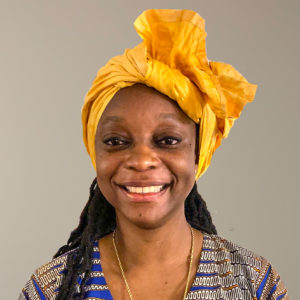 Many people managing their own company and parenting two children under ten require a lot of coffee. Diane Mbombo Tite has done all of this during a global pandemic while only drinking tea. “Coffee makes me jittery,” she says.
Many people managing their own company and parenting two children under ten require a lot of coffee. Diane Mbombo Tite has done all of this during a global pandemic while only drinking tea. “Coffee makes me jittery,” she says.
Mbombo’s newly launched company, Akula Interpreting and Translation, LLC, is the codification of her multi-lingual and multi-cultural life. Mbombo was born in the Democratic Republic of the Congo (DRC), and moved to Albany, New York in 2015. She speaks Swahili, Ciluba, Lingala, French, and English. “Akula” means “to talk or speak” in Ciluba, and the company provides interpreting, translation, and proofreading services. Thanks to her outreach to doctors, banks, hospitals, and legal providers, Mbombo has plenty of business.
Her own experience moving to Albany, New York revealed the clear need for services and providers in languages other than English. “The need for these languages in refugee and immigrant communities is so high,” says Mbombo, “so I decided to get trained and start to do the work myself.” Once trained as an interpreter and official translator, she began working for a local agency.
The COVID-19 pandemic brought her less work and more time to think about her professional goals. “I never anticipated this time to reflect and think about what I wanted to do,” says Mbombo. “So, I researched how to launch a company, and started my business in almost a week. I’m learning how to become a business manager. I’m trying to be adventurous and brave.”
This is not the first time Mbombo has started something new. When she decided to seek asylum from the DRC, she had few connections in Albany. The first few months were extremely challenging. Her family moved from hotel to hotel as she worked to secure employment and begin the arduous asylum process. “I knew I was going to become homeless very soon, so I started knocking doors and asking for help.” Coming from a Catholic background, Mbombo felt most comfortable looking to congregations for support. “I knew I could be safe in a church.”
Mary Giordano, executive director of Family Promise of the Capital Region (FPCR) in Albany, New York, was launching the organization in 2015 when she met Mbombo. When Giordano picked the family up from a friend’s apartment, Mbombo had a 2-year-old and a newborn baby. “I had been praying so much to find something like this,” says Mbombo.
Mbombo’s family was the first to work with FPCR, and some things were done on the fly. “As a family of four coming from another country, we needed a lot of attention,” Mbombo laughs. “Family Promise and my family did a lot of learning together. They were transparent about how they were developing with us. But we knew they had our back.”
For Giordano, the openness and sincerity of Mbombo’s family set FPCR up for success in the long run. “Since they were the first family, we were nervous to see how everything in the rotational model would work. It worked like clockwork. The family was flexible and accommodating. They set us up to help many other families.”
Mbombo’s family now lives in a house in an Albany suburb. Since working with the Mbombo family, FPCR has provided overnight hospitality to 44 families, and assisted others with rental assistance, household bills, medical bills, computers, and food delivery.
For both women, one memory sticks out. While Mbombo was staying at a host site, a volunteer mentioned that her child had watched a documentary about a renowned symphonic orchestra from the DRC, called the Kimbanguist Symphony Orchestra. The documentary was shown in their social studies class. Not only did Mbombo know about the orchestra, but she had sung alongside the orchestra while living in the DRC. She wanted to share her experience. For three years, Mbombo visited the local school district to speak about the orchestra and her time collaborating with them.
When the Kimbanguist Symphony Orchestra announced it would perform at Carnegie Hall in New York City, FPCR arranged for Mbombo to travel and join them onstage.
Whether in an Albany classroom, on a national stage, or on the job, Mbombo continues to serve others with her linguistic and cultural skills. Her recent focus is ensuring her children have the expertise, as well, so they can continue their relationships with those in the DRC. “The last thing I want to do is have my children be strangers to my family because they can’t communicate,” says Mbombo. She and her family continue to volunteer with FPCR.

